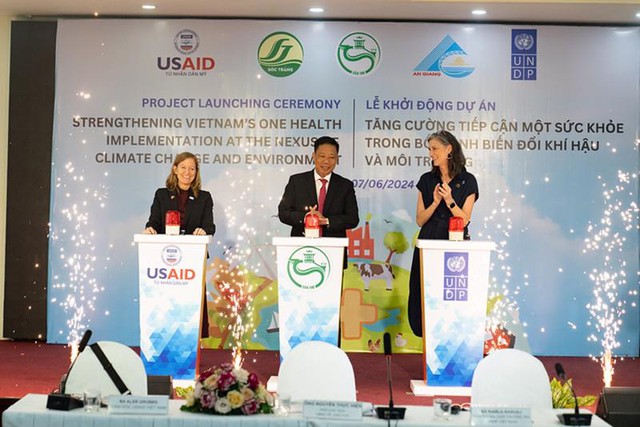USAID, UNDP helps address climate change-induced public health threats
VGP - The launching ceremony of project strengthening Viet Nam’s one health implementation at the nexus of climate change and environment took place in the Mekong Delta city of Can Tho on June 7.

From left to right: USAID/Viet Nam Mission Director Aler Grubbs, Vice Chairman of Can Tho City People’s Committee Nguyen Thuc Hien, and UNDP Resident Representative in Viet Nam Ramla Khalidi at the launching ceremony
The project was launched by the U.S. Mission to Viet Nam, through the U.S. Agency for International Development (USAID), and the United Nations Development Program (UNDP).
The initiative, implemented in Can Tho City and An Giang province, aims to build their local capacities to detect, prevent, and respond to climate change-related emerging infectious diseases.
Viet Nam is at a high risk for the emergence and re-emergence of zoonotic diseases, or infections spread between animals and people.
Further exacerbating this risk is Viet Nam's high vulnerability to climate change, including changes in rainfall patterns, saltwater intrusion, and more frequent and intense weather events and natural disasters.
The initiative launched will work with climate-vulnerable Can Tho City and An Giang Province in the Mekong Delta. In consultation with local stakeholders, including businesses and women's unions, the initiative will pilot provincial-level models that strengthen the climate change-related "One Health" response across the human, animal, and environmental health disciplines.
Potential activities include upgrading primary health infrastructure to support continuity of services during extreme weather events, expanding telehealth options, and equipping local authorities and health systems to be better positioned to respond to climate-induced public health threats.
The project will support authorities, communities and other partners in Can Tho and An Giang to detect, prevent, and respond to climate change-related public health threats, recognizing that human health is closely connected to the health of animals and the environment, said Ramla Khalidi, UNDP Resident Representative in Viet Nam, during remarks delivered at the event./.
